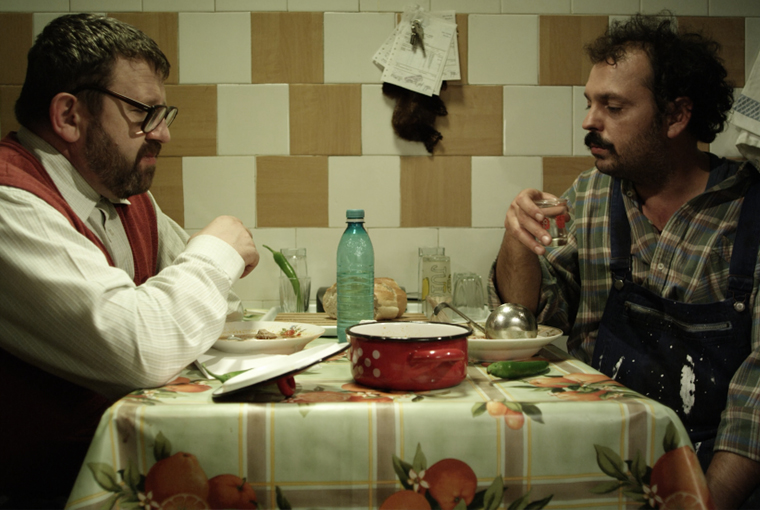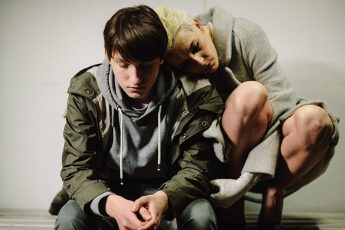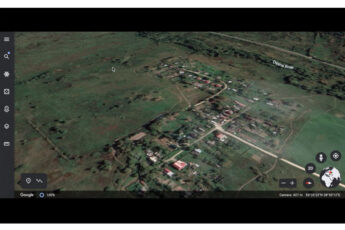If I Were a Rich Man…
Dan Chisu’s Chasing Rainbows (Si caii sunt verzi pe pereti, 2012)
Vol. 27 (March 2013) by Alina Popescu
Chasing Rainbows (Si caii sunt verzi pe pereti, 2012) is an independent production and Dan Chisu’s third feature film after WebSiteStory (2010) and The Bear (Ursul, 2011). Dan Chisu launched a late career in filmmaking, this time being involved as a director, screenwriter and producer.
His new film follows two parallel stories about the illusion of getting rich. One story is about a middle-age employee, Marius Tocitu (Adrian Titieni), who gets fired because he does not have any computer skills. This makes him suddenly realize that he won’t have a chance on the market without a CV and an e-mail address. So he starts taking computer lessons hoping that this will help him find a job. The other story is also about a man called Marius. But this Marius is much younger and earns a million dollars at a lottery promotion for cigarettes. He hangs out with friends in clubs dreaming to meet his unknown father. Unpredictable events changes the lives of the two protagonists. Mr. Tocitu receives a spam in his e-mail box announcing that he won a prize in a web lottery. In order to get that prize, he has to pay some fees, for formalities. Fearing that others might steal the money, he follows the advise of a neighbor and ships his savings into an economic black hole. Too late does he recognize the fraud. The prize the other Marius won was organized by a cigarette producer but Marius registered the ticket under his father’s name, whom he actually doesn’t know (and who is probably Mr. Tocitu). In order to get the money he thus needs to find his father. The girl who gave him the winning ticket helps him, hoping to share the sum. The two go to several cities, enter a few houses and discover many aspects of a sad reality that contradicts the life they associate with money. If the two Mariuses could meet, one would be the solution for the other. And this is what eventually happens, though not at the right moment, so that there is no happy-end.
The film was advertised as a comedy, although the absurd ending has more similarities to a profound drama. All characters end up with some form of disillusionment, but the biggest victim is Mr. Tocitu, who falls prey to the labor market and the new technologies. Only the unintentional humor of the characters turn the film into a comedy. Especially Mr. Tocitu, and his neighbor, played by two great actors, seem to carry the film’s entire comic weight. Although the film is full of surprises and tension, it doesn’t ask deeper questions. The editing technique and the development of the plotline as two parallel stories fits the idea of a race against time. Like in Run Lola Run (Tom Tykwer, 1998) the characters have deadlines to keep and are struggling against destiny’s unexpected turns.
Some of the film’s themes can also be found in other Romanian productions: the hilarious idea of adults learning how to use a computer has been used in a short film by Constantin Popescu Jr., The Yellow Smiley Face (2008). Of snails and men (Tudor Giurgiu, 2012) also talks about illusions, those of post-communist Romania and its “transition” to a free market. Kapitalism, our Improved Formula (Alexandru Solomon, 2010), talks about the overnight conversion of former communist elites into successful businessmen. Somehow, the idea of Solomon’s documentary is complementary to the idea of Chasing Rainbows, which, according to Dan Chisu, is a film about Romanian people waiting to get benefits without exertion.
Dan Chisu made this remark after a public screening held recently in Bucharest. Himself from a wealthy background, the remark must have been perceived by some as a slight irony. One spectator asked, in a tone of reproach, why he preferred to make the movie in this humorist key instead of seeking to identify what causes this Romanian dream of getting rich without efforts. Also, on a symbolic level, the film’s moral is that those who dream about easy money are being punished. Without having a clear answer, the director said the film was inspired by the realities he met, and that ultimately it’s hard to say why he made the movie in this way. The discussion in the room returned to this question several times so the lead actor also wanted to bring a perspective from the viewpoint of his generation: he is part of a generation, he said, that can be defined by waiting. But if his generation waited for more democracy, freedom, prosperity, and so on, his children and their generation, they would also wait. The only difference is that their dreams are about how to get a Bugatti Veyron. The moral, he said, is to “do something”, “do not deceive yourself”.
It is true that Chasing Rainbows offers neither psychological, nor sociological insights about the Romanian phenomenon of enrichment. Easy-money is not a specific Romanian dream, although the local color present in the film (for instance, covering the computer with a traditional piece of needlework or the aggressive promotional techniques of the local cigarette industry) could make you think it is. But if you were to look from the symbolic perspective proposed by the above mentioned spectator, one thing we can certainly say is that the Romanian economy does not look too good in recent Romanian productions. That does not prevent us from dreaming of a Romanian film where someone will become rich by working honestly.




Leave a Comment